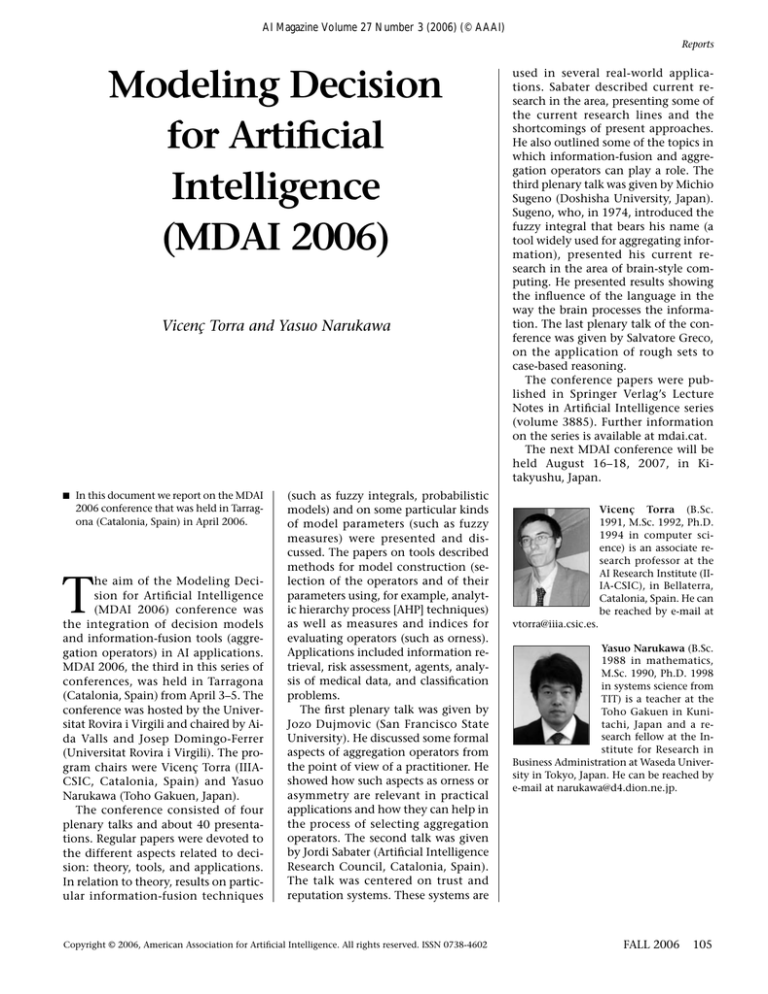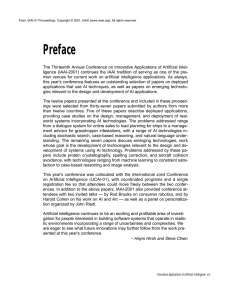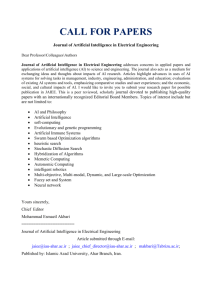
AI Magazine Volume 27 Number 3 (2006) (© AAAI)
Reports
Modeling Decision
for Artificial
Intelligence
(MDAI 2006)
Vicenç Torra and Yasuo Narukawa
I In this document we report on the MDAI
2006 conference that was held in Tarragona (Catalonia, Spain) in April 2006.
T
he aim of the Modeling Decision for Artificial Intelligence
(MDAI 2006) conference was
the integration of decision models
and information-fusion tools (aggregation operators) in AI applications.
MDAI 2006, the third in this series of
conferences, was held in Tarragona
(Catalonia, Spain) from April 3–5. The
conference was hosted by the Universitat Rovira i Virgili and chaired by Aida Valls and Josep Domingo-Ferrer
(Universitat Rovira i Virgili). The program chairs were Vicenç Torra (IIIACSIC, Catalonia, Spain) and Yasuo
Narukawa (Toho Gakuen, Japan).
The conference consisted of four
plenary talks and about 40 presentations. Regular papers were devoted to
the different aspects related to decision: theory, tools, and applications.
In relation to theory, results on particular information-fusion techniques
(such as fuzzy integrals, probabilistic
models) and on some particular kinds
of model parameters (such as fuzzy
measures) were presented and discussed. The papers on tools described
methods for model construction (selection of the operators and of their
parameters using, for example, analytic hierarchy process [AHP] techniques)
as well as measures and indices for
evaluating operators (such as orness).
Applications included information retrieval, risk assessment, agents, analysis of medical data, and classification
problems.
The first plenary talk was given by
Jozo Dujmovic (San Francisco State
University). He discussed some formal
aspects of aggregation operators from
the point of view of a practitioner. He
showed how such aspects as orness or
asymmetry are relevant in practical
applications and how they can help in
the process of selecting aggregation
operators. The second talk was given
by Jordi Sabater (Artificial Intelligence
Research Council, Catalonia, Spain).
The talk was centered on trust and
reputation systems. These systems are
Copyright © 2006, American Association for Artificial Intelligence. All rights reserved. ISSN 0738-4602
used in several real-world applications. Sabater described current research in the area, presenting some of
the current research lines and the
shortcomings of present approaches.
He also outlined some of the topics in
which information-fusion and aggregation operators can play a role. The
third plenary talk was given by Michio
Sugeno (Doshisha University, Japan).
Sugeno, who, in 1974, introduced the
fuzzy integral that bears his name (a
tool widely used for aggregating information), presented his current research in the area of brain-style computing. He presented results showing
the influence of the language in the
way the brain processes the information. The last plenary talk of the conference was given by Salvatore Greco,
on the application of rough sets to
case-based reasoning.
The conference papers were published in Springer Verlag’s Lecture
Notes in Artificial Intelligence series
(volume 3885). Further information
on the series is available at mdai.cat.
The next MDAI conference will be
held August 16–18, 2007, in Kitakyushu, Japan.
Vicenç Torra (B.Sc.
1991, M.Sc. 1992, Ph.D.
1994 in computer science) is an associate research professor at the
AI Research Institute (IIIA-CSIC), in Bellaterra,
Catalonia, Spain. He can
be reached by e-mail at
vtorra@iiia.csic.es.
Yasuo Narukawa (B.Sc.
1988 in mathematics,
M.Sc. 1990, Ph.D. 1998
in systems science from
TIT) is a teacher at the
Toho Gakuen in Kunitachi, Japan and a research fellow at the Institute for Research in
Business Administration at Waseda University in Tokyo, Japan. He can be reached by
e-mail at narukawa@d4.dion.ne.jp.
FALL 2006
105
Ca
ll f
or
Pa
pe
rs
Reports
AIIDE’07
Artificial Intelligence and
Interactive Digital Entertainment
Early June 2007
San Francisco Bay Area
Paper submissions due January 16, 2007
AIIDE'07 — the Third Conference on Artificial Intelligence and Interactive Entertainment — is the definitive point of interaction between entertainment software developers interested in AI and academic and industrial AI researchers. Sponsored by the American Association for
Artificial Intelligence (AAAI), the conference is targeted at both the research and commercial communities, promoting AI research and practice in the context of interactive digital entertainment systems with an
emphasis on commercial computer and video games. AIIDE'07 will include invited speaker sessions, paper presentation sessions, demonstration sessions, posters, exhibits, game programming competitions,
and other activities. We invite researchers and developers to share insights and cutting-edge results from a wide range of AI-related problems, and encourage the presentation of (1) results from core AI research areas applicable to interactive digital entertainment and (2) AI
approaches developed and fielded in commercial systems.
Because AIIDE'07 crosses disciplinary boundaries, all submissions will
be evaluated for their technical merit and for their accessibility both to
commercial game developers and to researchers. Work that spans both
research and commercialization is especially appropriate. All accepted
paper submissions will be published in the proceedings, and also available on CD. For a paper to appear in the proceedings, at least one author must register for the conference by the deadline for camera-ready
copy submission.
Electronic paper submission is required. Instructions are available at the
AIIDE web site. Full paper authors must submit their papers by January
16, 2007.
Please see www.aiide.org for additional information or e-mail the conference organizers at aiide07@aaai.org.
106
AI MAGAZINE





